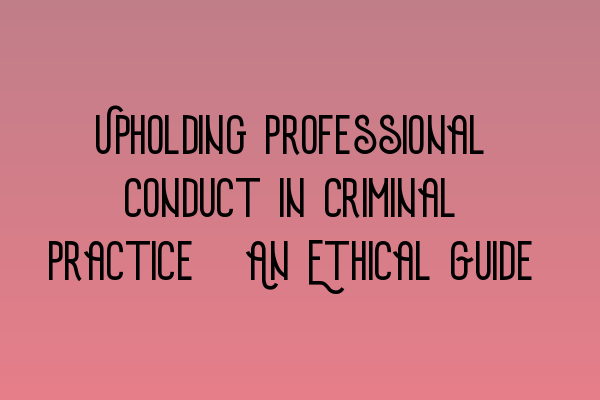Upholding Professional Conduct in Criminal Practice: An Ethical Guide
As legal professionals, it is our duty to not only represent our clients to the best of our abilities but also to maintain the highest standards of professional conduct. The criminal practice field, in particular, requires a strong commitment to ethical behavior. In this guide, we will explore the key principles and guidelines for upholding professional conduct in criminal law.
Understanding the Code of Conduct
The first step in upholding professional conduct is to familiarize oneself with the Code of Conduct for solicitors. This code sets out the expected standards of behavior, ensuring that solicitors act in the best interests of their clients while maintaining the integrity of the legal profession.
When practicing criminal law, solicitors must adhere to the principles of confidentiality, integrity, honesty, and independence. These principles form the foundation of ethical behavior and guide solicitors in their interactions with clients, colleagues, and the court.
It is crucial to remember that professional conduct extends beyond the courtroom. Solicitors must conduct themselves in a manner that upholds the reputation of the legal profession both in and out of the professional setting.
The Ethics of Representing Clients
Representing clients in criminal cases requires a delicate balance between advocacy and ethical responsibility. While it is our duty to vigorously defend our clients, it is important to ensure that this defense is conducted within the parameters of the law.
One of the key ethical considerations when representing clients is maintaining client confidentiality. Clients must have complete confidence that any information they share with their solicitor will be kept confidential. This trust is essential in building a strong attorney-client relationship.
Furthermore, solicitors must always act in the best interests of their clients. This means providing honest and accurate advice, even if it may not be what the client wants to hear. Solicitors should also avoid conflicts of interest that may compromise their ability to provide unbiased representation.
Responsibilities to the Court
In criminal practice, solicitors have a responsibility to the court as officers of the law. This duty requires solicitors to act with integrity, honesty, and professionalism in their interactions with the court, opposing solicitors, and witnesses.
When presenting a case, solicitors must ensure that they provide the court with a fair and comprehensive representation of the facts. Misleading the court or withholding crucial information is a breach of professional conduct and undermines the integrity of the legal system.
Moreover, solicitors should always strive to maintain respectful and professional relationships with opposing solicitors. While the nature of the adversarial system may breed tension, it is important to remember that our ultimate goal is to seek justice, not simply win the case.
Continuing Professional Development
As with any profession, staying up-to-date with current legal developments is essential for maintaining high standards of professional conduct. Continuing professional development (CPD) allows solicitors to enhance their skills, stay informed about changes in the law, and further their understanding of ethical considerations.
Participating in SQE 1 Practice Exam Questions and SQE 1 Practice Mocks FLK1 FLK2 not only prepares solicitors for the SRA SQE exam but also ensures that their knowledge and skills are aligned with ethical standards. Similarly, SQE 2 Preparation Courses and SQE 1 Preparation Courses provide valuable education and resources for professional development.
Overall, upholding professional conduct in criminal practice is a responsibility that should be taken seriously. By adhering to the Code of Conduct, acting in the best interests of clients, respecting the court, and remaining committed to continuous professional development, solicitors can maintain the integrity of the legal profession while providing exceptional representation to their clients.
For more information on SQE exam dates, please visit the SRA SQE Exam Dates page.
